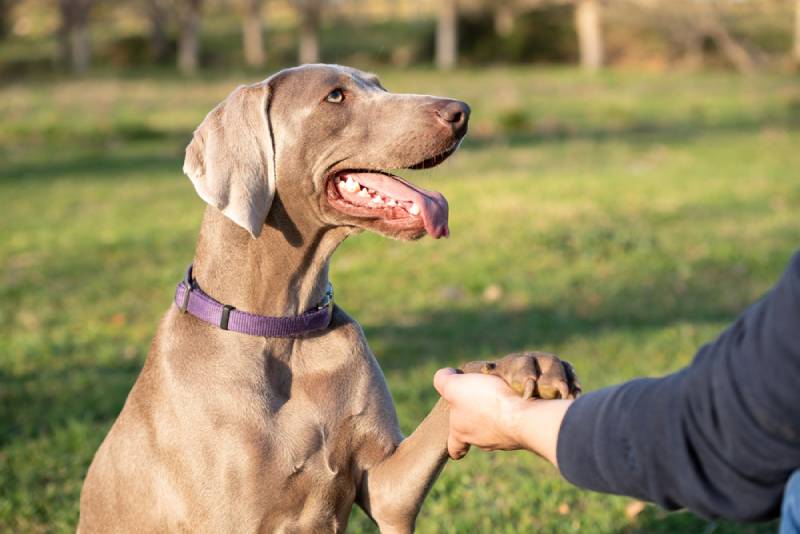Weimaraners have always had a reputation for being aggressive dogs. This myth has been perpetuated for many years, and some people still believe it today. However, the truth is that Weimaraners aren’t inherently aggressive dogs. In fact, they’re known for their calm, loyal, and friendly personalities. So, why do people think they are aggressive? And can they be loving companions for homes with children or other pets? Let’s discuss.

How Did This Myth Start?
The myth that Weimaraners are aggressive probably started because of their appearance. They’re large, muscular dogs with strong jaws and a serious expression. This can make them look intimidating, especially to people who are not familiar with the breed. In addition, these dogs were originally bred as hunting dogs, which means they have a high prey drive and can be protective of their owners. However, these traits do not necessarily make them aggressive.
Another reason why Weimaraners have been labeled as aggressive is because of their energy level. They’re a highly active breed that requires a lot of exercise and mental stimulation. If they don’t get enough exercise or if they’re left alone for long periods of time, they can become easily bored and super destructive. This can lead to unwanted behaviors, such as chewing, digging, and barking. However, these behaviors aren’t necessarily signs of aggression.

Weimaraner Breed Personality
To understand the true temperament of Weimaraners, it’s important to look at their history and breed standards. Weimaraners were originally bred in Germany in the early 19th century as hunting dogs. They were trained to hunt large game, such as deer and wild boar. As a result, they’re very smart, independent, and have a strong prey drive. They’re also loyal and affectionate towards their owners, making them really awesome as family pets.
According to the American Kennel Club (AKC), Weimaraners are “friendly, fearless, alert, and obedient.” They’re known for their intelligence and trainability, which makes them great dogs for various activities, like obedience, agility, and scent tracking. They’re also really good with children and other pets – as long as they’re properly socialized.

Things That Influence a Weimaraner’s Behavior
Like any other dog breed, a Weimaraner’s behavior is influenced by various factors, such as genetics, environment, and training.
Genetics
The temperament of a dog is largely dependent on its genetic makeup. Certain breeds are known to have distinct behavioral traits that have been selectively bred for over generations. For example, herding dogs have a natural tendency to control and protect, while retrievers are hardwired to retrieve game. Similarly, some breeds like the Weimaraner have a reputation for being aggressive due to certain genes that contribute to their predisposition.

Environment
Environment also plays a big role in a dog’s behavior. If a Weimaraner is raised in a loving and nurturing environment, it’s way more likely to be well-behaved and friendly. On the other hand, if a Weimaraner is raised in a negative or abusive environment, it’s more likely to exhibit unwanted behaviors, such as aggression.
Training
And then there’s training, of course. Using positive reinforcement to train a Weimaraner is a great way to prevent unwanted behavior in these dogs, particularly when it’s done while they’re puppies. So, what does this look like? It involves rewarding good behavior with treats, praise, and affection, and ignoring or redirecting unwanted behavior. Note that harsh punishment or physical corrections can lead to fear and aggression in Weimaraners. Talk to a vet if you need some initial tips and pointers for the proper training techniques.
If you need to speak with a vet but can't get to one, head over to PangoVet. It's our online service where you can talk to a vet online and get the advice you need for your pet — all at an affordable price!

Addressing Common Behavioral Issues in Weimaraners
Like any other dog breed, Weimaraners can develop unwanted behaviors if they aren’t trained right or socialized. Here are some common behavioral issues in Weimaraners and how to address them.
Separation Anxiety
These pups are known for their loyalty and can become anxious when left alone for long periods of time. To address this issue, try to gradually increase the amount of time your Weimaraner spends alone and provide them with toys and puzzles to keep them occupied.

Destructive Behavior
Weimaraners are a highly active breed that requires a lot of exercise and mental stimulation. If they don’t get enough exercise or if they are left alone for long periods of time, they can become bored and essentially tear up your house or backyard. To address this issue, make sure your Weimaraner gets enough exercise and mental stimulation, and provide them with toys, exercise, and room to run around to keep them occupied.
Social Aggression
While Weimaraners aren’t inherently aggressive, they can and will give in to their natural canine instincts if you don’t rein them in when they’re young. One of the best ways to do this is to start them with obedience training and to establish rules and boundaries. In short, your Weimaraner needs to understand that you’re the boss and all rules need to be obeyed at all times. This will take time and consistency, but it’s definitely going to pay off when the dog becomes an adult.
Tips for Living with a Weimaraner
Be sure to provide your dog with enough exercise and mental stimulation. These dogs need at least an hour of vigorous exercise on a daily basis. This includes activities such as hiking, running, swimming, or playing fetch. They also benefit from training sessions that challenge their intelligence and problem-solving skills. Without enough physical and mental stimulation, Weimaraners can become quite the home terrorist.
Train Them Young
Weimaraners are also known for having superb hunting instincts. As a result, you may notice that they will try to chase small animals or birds. It’s advised to keep your Weimaraner on a leash or in a fenced-in area when outside to prevent these behaviors. Training them young can also help your dog learn to ignore small animals and focus on other activities.

Groom Them Regularly
Grooming is another aspect of living with a Weimaraner. These dogs have short coats that require little grooming, but they do shed moderately throughout the year. Regular brushing can help remove loose hair and keep your dog’s coat shiny and healthy. You’ll also want to check your Weimaraner’s ears regularly for signs of infection, as they have large floppy ears that can trap moisture easily.
Show Them Some Love
Be sure to shower your Weimaraner with plenty of love and attention. These dogs absolutely thrive on human companionship and can become quite sad or anxious if left alone for long periods of time. They also benefit from a consistent routine and regular training sessions to reinforce positive behaviors. So be sure to walk your dog every day or allow them to roam around in a fenced backyard. You can also take your dog hiking, to the beach, or to local dog parks to socialize with other dogs and owners.
Frequently Asked Questions
Do Weimaraner dogs like playing in the water?
When it comes to water, Weimaraners seem to have a bit of a mixed response. While some Weimaraners definitely love to swim and play in the water (and you can see evidence of this on YouTube), others may be hesitant or even afraid of it. So, it largely depends on the individual dog’s personality and experiences with water. Proper training can help encourage Weimaraners to enjoy the water and build confidence. You can do this by training your pup in a small kiddie pool or even in your bathtub. And always supervise your Weimaraner around water to ensure their safety, regardless of their level of comfort with it.

Are Weimaraners good support dogs?
Weimaraners are versatile dogs that were originally bred for hunting and tracking. But, when it comes to being a support dog, there are some pros and cons to consider. On the one hand, Weimaraners are known for their strong bond with their owners, which can make them great emotional support animals. They’re also very sensitive and intuitive, which means they can pick up on their owner’s emotions and respond accordingly.
On the other hand, though, they can be stubborn and independent-minded, which can make them challenging to train as support dogs. They also have a lot of energy and need plenty of exercise and mental stimulation to stay healthy and happy. This means that they may not be suitable for people with limited mobility or those who cannot provide them with the level of physical activity they require.
Do Weimaraners get along with cats?
Whether or not they get along with cats depends on their individual personality, training, and how much they’ve been socialized. Some Weimaraners may have a strong prey drive and may see cats as prey, while others may be more accepting of feline companionship. So, it helps to introduce a Weimaraner to a cat gradually and under controlled circumstances. Supervision is key in ensuring that both the dog and cat are safe and comfortable around each other.
Wrapping Things Up
So, to wrap things up, though these dogs have a reputation for being aggressive if not properly trained or socialized, it’s not necessarily true for all Weimaraners. Overall, these dogs are active, smart, loyal, and require a lot of mental stimulation and daily exercise in order to make owning one a rewarding experience.
Featured Image Credit: DragoNika, Shutterstock




















